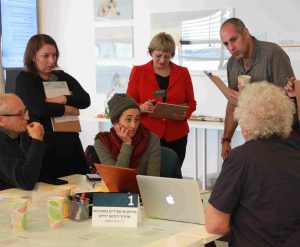What does the Heschel Center have to do with germs!? Hearing the focus of our recent Hackathon, many people raised an eyebrow. But it turns out that antibiotics are a limited resource that suffers from the tragedy of the commons. The social and health implications of this “wicked problem” are due to become, in a very short time, harsher than cancer. Despite huge advances in science, the development and widespread use of new types of antibiotics lead to evolutionary changes in the germ populations they are meant to fight, creating resistance to those same antibiotics. The issue is critical: by 2050, the worldwide mortality rate connected to bacterial resistance is estimated to reach as high as 10 million deaths a year, which forms a global threat with massive economic implications as well.
Last week, as part of the Hackathon that took place as a close collaboration between the Heschel Center’s Fellows program and the Mimshak program of the Israel Society for Ecology and Environmental Studies (ISEES) we learned that bacterial resistance has many different sources not specifically from the health sector. These include: overmedication of poultry in animal husbandry, lack of treatment of sewage from hospitals and households, bad nutrition, lack of supervision of medication dosages, and even from the doctor-patient relationship.
During an intense 36 hour period, nine different teams (all of which were made up of different representatives from a variety of sectors and professional backgrounds) worked on proposals for practical, systemic, innovative and sustainable solutions, with very little sleep but a lot of good food, at Ben Gurion University.
The proposed solutions also came from different “worlds,” technological and otherwise. There were apps or computer based approaches, a national inventory, a chemical tablet to use in the lavatory, sophisticated ventilation systems, and even nutrition suggestions for the daily diet of hospitalized patients.
All the project teams presented their systems thinking, upstream solutions, and a huge amount of sheer creativity. The three winning ideas presented their whole analysis, from the definition of the problem to be addressed, the brainstorming stage raising a range of possible solutions, their choice of a particular direction to focus on and develop, validity assessment, and searching for relevant examples in Israel and the world.
Nir Goldstein, a fellow in the current cohort of Heschel Fellows, was part of one of the winning teams. “We quickly understood that 80% of all antibiotics are used with animals. After a few exploratory conversations, we understood that there is a great deal of relevant regulation on the books, but no public sector body has access to data from the field, and so it is impossible to monitor the enforcement of the regulation,” he explained. “We were pleased to discover that several senior officials in industry and government were willing to cooperate with us, and helped us understand exactly what was necessary to improve the situation. Nir’s team proposed an approach based on regulating the supervision of the dispensing of medications by prescriptions to farms in a centralized computer system, which would alert the Ministry of Agriculture when there were irregularities or excesses, documented on an ongoing basis. They presented several examples of systems like this from other countries.
“The Hackathon created connections between experts from different backgrounds, that enabled us to understand the depth of the problem, and how to address it from new angles. Since the Hackathon, we are in contact with several actors in the Ministries of Health and of Environment, in an attempt to translate this into reality,” he adds. “In general, the event created a feeling of empowerment to be able to initiate change, even for people who do not come from an entrepreneurial background.

Prof. Nadav Davidovich, director of the School for Public Health in the Faculty of Health Sciences at Ben Gurion University, was part of the steering committee of the Hackathon. “The unique connection between public health and sustainability, and between the different organizations: the School for Public Health in the Faculty of Health Sciences at Ben Gurion University, the Mimshak Fellows of the ISEES, and the Heschel Fellows, is the best way to deal with intransigent problems such as bacterial resistance,” he says. “It is only in this way, by breaking down disciplinary and institutional boundaries, that we can think outside our respective boxes and find sustainable solutions to health and environment.”
The judges selected to evaluate the entries at the Hackathon were impressive. They included: the chair of the Israeli Society for Infectious Diseases, the CEO of the Assaf Harofe hospital, the director of the children’s ward at Hadassah Hospital, an assistant CEO at the Wolfson Hospital, the director of the department for the prevention and supervision of infections at Shiba Hospital, as well as senior staff at BGU, distinguished representatives from the Israeli Innovation Institute, the Bezalel School of Art and Design, the Ministry of Health, and the medical director of TEVA Pharmaceuticals, which also helped sponsor the event.
“We were very pleased by the collaboration with the staff of the Mimshak Program. The combination of the two programs was interesting and stimulating, and we will continue it to additional projects,” said Shachar Kahanovich, the director of the Center for Sustainability Studies at the Heschel Center, who was one of the organizers of the event. “The very distinguished panel of judges was surprised at the depth, the seriousness and the creativity of the project ideas. We are sure that several of them will be continued, and be brought to fruition, and have a significant influence on society.
Many thanks to our partners in the Mimshak program, BGU, the pharmaceutical company sponsors TEVA, MSD, GSK, RFA, Shiba-Tel Hashomer Hospital and Medical Center, Soroka Medical Center, Science Abroad, the Israeli Society for Infectious Diseases, the Department of Social Services of Beer Sheva, the Union of Public Health Doctors, and the Jewish Federation of Montreal.
